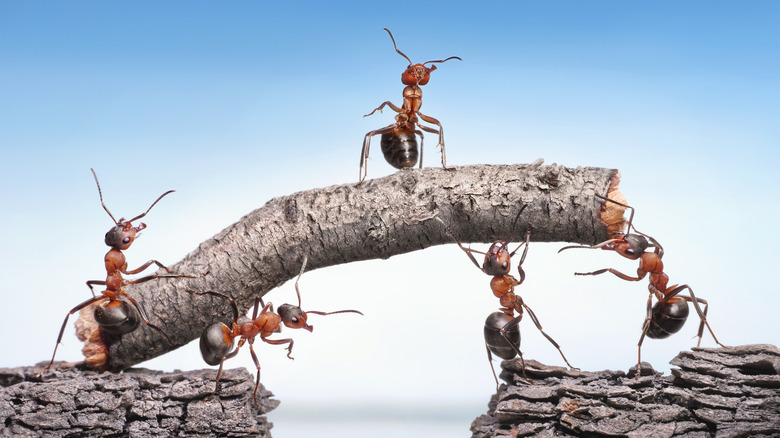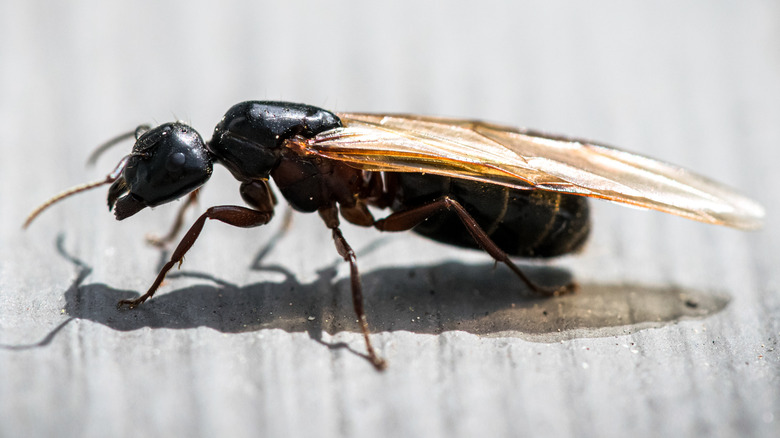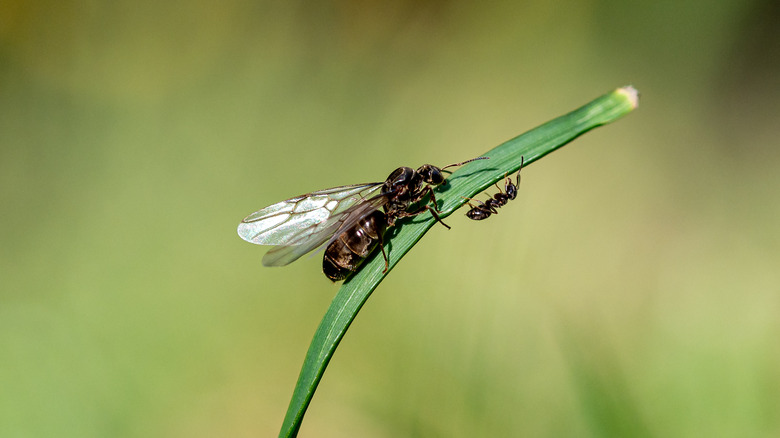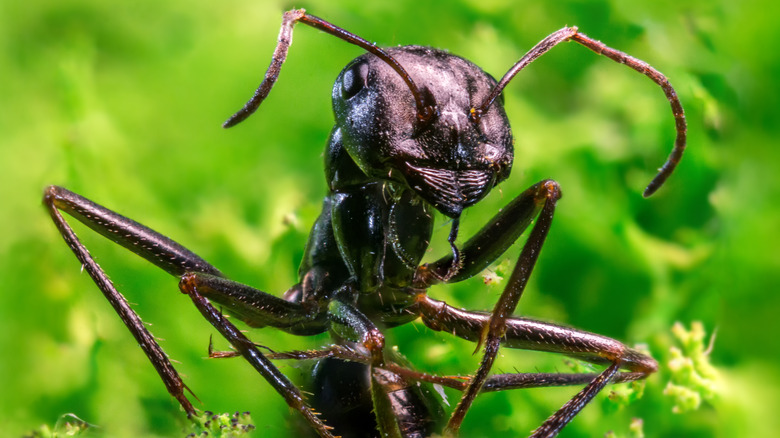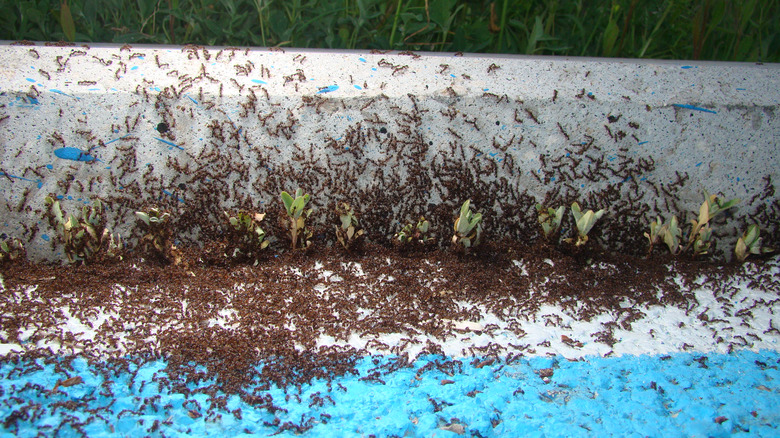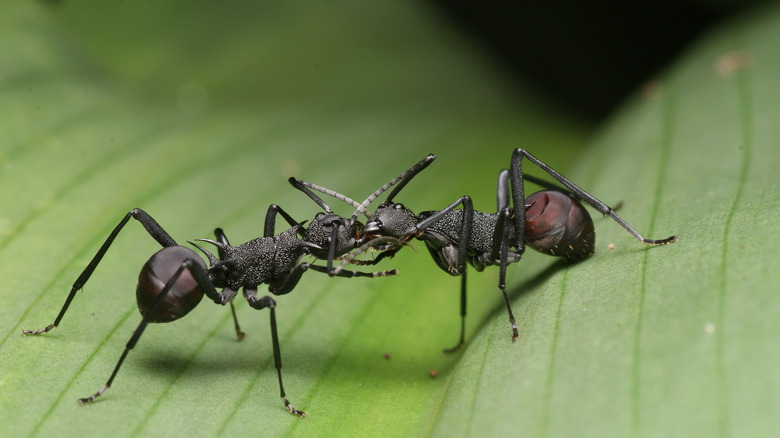The Untold Truth Of Royal Ants
While most people are familiar with the Queen Bee, both as a fact of nature and a metaphor for a female boss, the monarchy of ants is perhaps lesser known (though equally interesting). Certainly, the ant colony holds a respectable place in society, both figuratively and literally. Ants are often depicted as diligent workers, flexing their muscles to lift objects 5,000 times their own weight (via Entomology Today). But don't let these brutish physical attributes fool you. Ants are just as sophisticated as they are strong.
In addition to producing sound from their abdomens that can be described as a kind of talking (via Vice), ants have also put together quite the royal family. Royal ants live quite differently from the workers toiling beside them. Some of these creatures are so magical, they even fly (via Cool Kid Facts). Here's a look at the lives of these ant queens, princesses, and princes who never live to be kings.
Queen ants and their mates can fly
Royal ant life has its perks, and one of them is flight. The soon-to-be-queen ant is easily identified at birth because she is the only ant born with wings (via Cool Kid Facts). As summertime approaches, known in the ant community as mating season, the queen's suitors, who could be described as drones or princes, will also sprout wings.
Swarming ants mate in mid-air in a reproductive process called nuptial flight (via National History Museum). During this process, the winged creatures swirl through the sky intertwined. The courtship creates such a spectacle that some citizens have gone as far as to declare July 12 "Flying Ant Day" (via National World) despite the fact that nuptial flight takes place all summer long, and sometimes even happens during spring. This Romeo-Juliet style mating may start off whimsical and romantic but it quickly takes a grim turn. Once the courtship has ended, the queens morbidly chomp off their own wings. The fate of the princes proves even more tragic.
Fatherless ant princes never live to be kings
Male ants are born princes, but they're not heirs to the throne. This monarchy is led only by queens. Most winged males die approximately one to two weeks after copulation, leaving behind nothing but their legacy in the form of sperm (via Orkin Canada).
In an even stranger twist of fate, flying male ants do not live long enough to meet their offspring, who are not always even their children; some of their offspring are their grandchildren. Phys reports that the sex of a male ant is determined by its number of genome copies, as opposed to chromosomes. Due to the fact that princes are produced via fertilized eggs, they are essentially born fatherless. And because they develop in a fatherless state, they are incapable of having sons. Henceforth, any male ants that arise as a result of their sperm are not their sons, but their grandsons, who will also die before inheriting the throne.
The Queen ant lives decades longer than the worker ants
The lives of male ants in general are painfully short. According to Harvard Forest, all the worker ants you see bench-pressing sandwiches that weigh 5,000 times more than they do are female. Even in the safety of captivity, female worker ants only typically survive for about one year (via Phys). Queen ants, on the other hand, can live 30 times longer, or three full decades in total.
You might imagine that these royal queens' lives are luxurious, at least in comparison to their female counterparts who are not only short-lived workers but sometimes even slaves stolen from neighboring ant hills (via National Geographic). But alas, those 30 years of a queen ant's life are served in unparalleled drudgery. The life of a queen ant is one of labor, exhaustion, and even war. The only rest they find is when their lovers die and they are forced to sit starving beneath the soil for weeks after having eaten off their own deflated wings.
Queen army ants lay hundreds of thousands of eggs per day
According to NPR, ants outnumber humans by an astronomical 3 billion (their 10 billion to our 7 billion) in population. You might assume it takes a great deal of work to reproduce at such accelerated rates, which is true. But beyond that, this busywork falls upon the shoulders of just a few royal queens. A study conducted by Stanford biologists found that only 25% of ant colonies end up successfully reproducing. Out of 300 ant colonies, all of the reproduction was the work of just a few lone queens.
While the precise number of eggs laid by a queen varies by species, PBS reports that army ant queens lay up to 300,000 eggs in a matter of days, but that's not all. Due to the vulnerability of not having a nest, the queen is forced to give birth behind a three-foot wall comprised of 700,000 soldier ants. No pressure, though. She's only responsible for preserving the entire species before the watchful eyes of all her fellow ants.
Queen ants duel to the death in a battle to be crowned immortal
Perhaps one of the most cutthroat royal friendships is the one that exists between queen ants. According to Live Science, ant colonies tend to thrive when they host multiple queens. This friendship starts off sweet, with the queens collectively producing a massive, productive workforce. However, once the workers have matured, the friendship quickly goes south, ending in a duel to the death where only one queen can survive and reign.
New research reveals that these queens are so power-hungry that some of them are willing to sacrifice the entire colony for the preservation of self. What does an ant queen win when she kills her best friends and finally takes her throne? According to PBS, she gains perceived immortality. This is not the same as actual immortality, for the queen ant does eventually die. However, she outlives her fellow ants at a rate that is comparable to thousands of human years. She effectively reins over her fellow ants for approximately 30 generations. Through their lens, she therefore appears to live forever, a title she's willing to earn at any cost.
